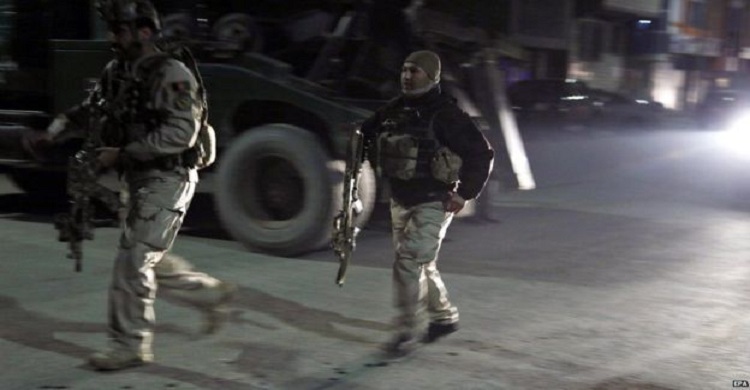Taliban Attacks Spanish Embassy Compound in Kabul

Taliban militants on Friday night attempted to storm a Spanish embassy compound here, killing a Spanish security official and wounding 10 other people in the latest high-profile attack by the group following government efforts to revive peace talks aimed at ending the insurgency.
The attack started with a car bomb that detonated close to the compound’s gates, causing an explosion that shook buildings across the diplomatic district in the city center, shattering nearby windows.
A Spanish embassy official said the blast had allowed the attackers to breach the compound walls and enter the building.
Sporadic gunshots and explosions rang out over the city for hours after the attack, as two of the militants were gunned down by special police units deployed to the scene.
A police source said at least five had been involved in the attack and the others were still being hunted down.
At midnight, six hours after the attack started, a series of explosions were heard. A security official said the blasts were caused by rocket-propelled grenades fired at the attackers as part of an operation to clear the area.
It wasn’t immediately clear which building had been targeted. There are at least two compounds run by the Spanish embassy in the area of the attack, including the ambassador’s residence and its intelligence agency, and it was not possible to reach the site of the attack.
The Spanish embassy itself is located in a heavily fortified area several streets away.
The Afghan interior ministry confirmed a bomb had detonated close to the Spanish embassy and said police had been deployed to the scene to cordon off the area.
Spanish Prime Minister Mariano Rajoy said the attack had not been against the embassy itself but guest houses nearby. An official at Spain’s foreign ministry said the guest houses were not managed or owned by the Spanish government.
He couldn’t immediately confirm which delegation managed them. The official said that Americans often stayed in those guest houses as the U.S. embassy is close by.
A State Department spokesman said all U.S. chief of mission personnel are accounted for. The embassy in Kabul issued a security message warning U.S. citizens to avoid the area near the Spanish embassy.
Spain’s interior ministry identified the dead security guard as Isidro Gabino Sanmartín Hernández, 48 years old, a member of the Spanish police force that guards Spanish diplomatic compounds around the world.
The hospital run by Emergency, an Italian non-governmental organization, said it had received eight casualties in the first two hours after the blast. Most of the victims were lightly wounded by broken glass and debris.
A spokesman for the Taliban claimed responsibility for the attack, saying the compound had been targeted because it was used by foreign intelligence officials.
The attack, the spokesman said, was part of the Taliban’s “regular operations.”
The capital has been on high alert for a couple of weeks and the Spanish compound may have been an easier target because it is located several streets away from the diplomatic enclave that is commonly referred to as Kabul’s “Green Zone.”
The timing of the attack cast doubt over efforts on the part of Afghan and Pakistani governments to resurrect peace talks with a splintering Taliban.
The Spanish embassy assault was the second high-profile attack claimed by the militant group since President Ashraf Ghani visited Pakistan for a regional conference earlier this week.
The meetings ended on Wednesday, with an agreement between both countries to work toward restarting the process.
As the conference was underway in Islamabad, the Taliban carried out a large-scale attack on the airport in Kandahar, Afghanistan’s second city, killing at least 54 civilians and military personnel.
Previous efforts fell apart in July after the Taliban’s supposed leader Mullah Mohammad Omar was revealed to have been dead for over two years.
His deputy, Mullah Akhtar Mansour, was swiftly appointed as the new leader, a decision that powerful members of the group later contested.
It is unclear how the leadership dispute will impact prospects for peace, as negotiations remain focused on bringing Mullah Mansour to the table for talks.
The agreements in Islamabad triggered an angry reaction in Afghanistan, where the country’s intelligence agency chief of five years,
Rahmatullah Nabil quit. Nabil had long opposed forging closer ties with Pakistan, accusing its neighbor of using the Taliban as a proxy force to interfere in Afghanistan’s internal affairs and of sheltering to the militant group’s leadership.
The president has accepted the resignation and appointed his deputy, Masoud Andarabi, as his successor.
In Washington, State Department spokesman John Kirby said that continuing acts of violence underscored that Afghanistan remains a dangerous place, but also said it demonstrated the urgency of pursuing a process of reconciliation. “Our view is that momentum is still going to move forward,” Kirby said.


